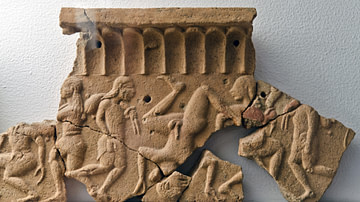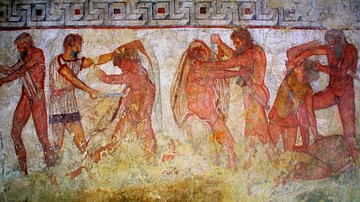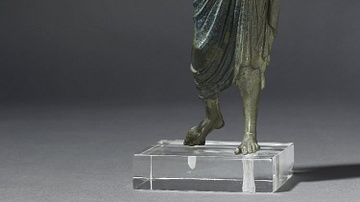Search Definitions
Browse Content (p. 211)

Definition
Villanovan Culture
The Villanovan culture flourished during the Iron Age in central Italy from c. 1000 to c. 750 BCE. It was a precursor of the Etruscan civilization, although the two populations are actually the same and the term Villanovan should not imply...

Definition
Acquarossa
Acquarossa, located in the north of Italy's Lazio region, is the site of an Etruscan settlement of unknown name. Although much smaller than other, more famous Etruscan towns, Acquarossa has proved invaluable for archaeologists as it has not...

Definition
Ninurta
Ninurta (identified with Ningirsu, Pabilsag, and the biblical Nimrod) is the Sumerian and Akkadian hero-god of war, hunting, and the south wind. He first appears in texts in the early 3rd millennium BCE as an agricultural god and local deity...

Definition
Ancient Crete
Crete is an island in the eastern Mediterranean which during the Bronze Age produced the influential Minoan civilization with its distinctive architecture and art. An important member of the Greek world in the Archaic period, Crete dipped...

Definition
Pazuzu
Pazuzu is an Assyrian/Babylonian demonic god who was most popular in the first millenium BCE. He was the son of Hanbi (also Hanba), king of the demons of the underworld, and brother to Humbaba, the demon-god protector of the Cedar Forest...

Definition
Francois Tomb
The Francois Tomb is an Etruscan tomb located at Vulci (Velch to the Etruscans), a town located 12 km from the western coast of central Italy, by the banks of the Fiora River. Flourishing as a trading port between the 6th and 4th century...

Definition
Utu-Shamash
Utu (also known as Shamash, Samas, and Babbar) is the Sumerian god of the sun and divine justice. He is the son of the moon god Nanna and the fertility goddess Ningal in the Sumerian tradition but was known as Shamash (Samas) to the Akkadians...

Definition
Etruscan Architecture
The architecture of the Etruscan civilization, which flourished in central Italy from the 8th to 3rd century BCE, has largely been obliterated both by the conquering Romans and time, but the very influence of the Etruscans on Roman architecture...

Definition
Roman Britain
Britain was a significant addition to the ever-expanding Roman Empire. For decades, Rome had been conquering the Mediterranean Sea – defeating Carthage in the Punic Wars, overwhelming Macedon and Greece, and finally marching into Syria and...

Definition
Etruscan Religion
The religion of the Etruscans, the civilization which flourished from the 8th to 3rd century BCE in central Italy, has, like many other features of the culture, long been overshadowed by that of its Greek contemporaries and Roman conquerors...